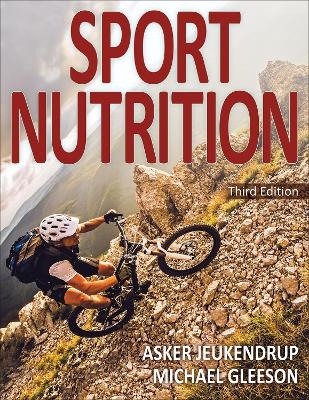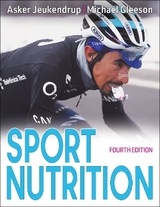
Sport Nutrition 3rd Edition
Human Kinetics (Verlag)
978-1-4925-2903-3 (ISBN)
- Titel erscheint in neuer Auflage
- Artikel merken
Back for a third edition, Sport Nutrition presents the principles and rationale for current nutrition guidelines for athletes. Using a physiological basis, this text provides an in-depth look at the science behind sport nutrition.
This new edition has been structured with the student in mind. It moves from general principles of nutrition to estimating and fulfilling energy needs with the appropriate combinations of macro- and micronutrients. There is also content on supplements from a scientific standpoint.
More than just a simple prescription of recommendations, Sport Nutrition, 3rd Edition offers a systematic presentation of the science supporting nutrition guidelines. It is an ideal book to provide a comprehensive understanding of nutrition and how it relates to sport, exercise performance, training and recovery.
Asker Jeukendrup is considered a leading expert in the general areas of sport nutrition, training and overtraining and recovery. He is a registered sport and exercise nutritionist and has worked with several elite athletes and clubs around the world, including Chelsea FC, FC Barcelona and UK Athletics. Michael Gleeson is a professor of exercise biochemistry in the School of Sport, Exercise and Health Sciences at Loughborough University. Gleeson is considered a world authority on exercise biochemistry, immunology and nutrition. He has worked with numerous world-class athletes and professional football clubs.
Chapter 1. Nutrients and Recommended Intakes
Function of Nutrients
Carbohydrate
Fat
Protein
Water
Alcohol
Vitamins, Minerals, and Trace Elements
Phytonutrients
Recommended Intakes of Nutrients
Development of Recommended Intakes
Current Recommended Intakes
Analyzing Dietary Intake
Chapter 2. Healthy Eating
Health Effects of Consuming Excess Amounts of Nutrients
Practical Guidelines for a Balanced, Healthy Diet
Recommendations for a Healthy Diet and Lifestyle
Nutrition Facts Labels
Nutrient Content and Health Claims on Food Packaging
Processed Food and Additives
Fat Substitutes
Chapter 3. Fuel Sources for Muscle and Exercise Metabolism
Subcellular Skeletal Muscle Structure
Force Generation in Skeletal Muscle
Fiber Types
Energy for Muscle Force Generation
Fuel Stores in Skeletal Muscle
Regulation of Energy Metabolism
Metabolic Responses to Exercise
Metabolic Adaptations to Exercise Training
Chapter 4. Energy
Energetic Efficiency
Measuring the Energy Content of Food
Measuring Energy Expenditure
Components of Energy Expenditure
Energy Balance
Chapter 5. Gastric Emptying, Digestion, and Absorption
Anatomy of the Gastrointestinal Tract
Regulation of the Gastrointestinal Tract
Digestion
Absorption
Gut Microbiota
Regulation of Gastric Emptying
Gastrointestinal Problems During and After Exercise
Chapter 6. Carbohydrate
History
Role of Carbohydrate
Recommendations for Carbohydrate Intake
Carbohydrate Intake in the Days Before Competition
Carbohydrate Intake in the Hours Before Exercise
Carbohydrate Intake 30 to 60 Minutes Before Exercise
Carbohydrate Intake During Exercise
Carbohydrate Intake After Exercise
Chapter 7. Fat
Fat Metabolism During Exercise
Limits to Fat Oxidation
Fat as a Fuel During Exercise
Regulation of Carbohydrate and Fat Metabolism
Fat Supplementation and Exercise
Effects of Diet on Fat Metabolism and Performance
Chapter 8. Protein and Amino Acids
Amino Acids
Techniques to Study Protein and Amino Acid Metabolism
Protein Requirements for Exercise
Training and Protein Metabolism
Effect of Protein Intake on Protein Synthesis
Amino Acids as Ergogenic Aids
Protein Intake and Health Risks
Chapter 9. Water Requirements and Fluid Balance
Thermoregulation and Exercise in the Heat
Effects of Dehydration on Exercise Performance
Mechanisms of Heat Illness
Effects of Fluid Intake on Exercise Performance
Daily Water Balance
Fluid Requirements for Athletes
Chapter 10. Vitamins and Minerals
Water-Soluble and Fat-Soluble Vitamins
Recommended Intakes of Vitamins
Recommended Intakes of Vitamins for Athletes
Macrominerals and Microminerals
Recommended Intakes of Minerals
Critical Micronutrient Functions
Assessing Micronutrient Status
Exercise and Micronutrient Requirements
Ergogenic Effect of Micronutrient Supplementation
Summary of Recommendations for Micronutrient Intake in Athletes
Chapter 11. Nutrition Supplements
Relative Importance of Supplements to a Normal Diet
Nonregulation of Nutrition Supplements
Critical Evaluation of Nutrition Supplements Studies
Androstenedione
Bee Pollen
Beetroot Juice
Beta Alanine and Carnosine
Beta-Hydroxy Beta-Methylbutyrate
Boron
Caffeine
Carnitine
Cherry Juice
Choline
Chromium
Coenzyme Q10
Creatine
Dehydroepiandrosterone
Fish Oil and Omega-3 Fatty Acids
Ginseng
Glandulars
Glycerol
Green Tea
Inosine
Ketone Salts
Lactate Salts and Polylactate
Lecithin
Medium-Chain Triacylglycerol
Pangamic Acid
Phosphatidylserine
Phosphorus and Phosphate Salts
Polyphenols
Pyruvate and Dihydroxyacetone
Sodium Bicarbonate
Sodium Citrate
Sodium Nitrate
Vanadium
Wheat Germ Oil
Additive Effects of Combining Different Supplements
Contamination of Nutrition Supplements
Chapter 12. Nutrition and Training Adaptations
Training Adaptations
Signal Transduction Pathways
Starting a Signaling Cascade
Secondary Signals
Nutrition and Effects on Training Adaptations
Overreaching and the Overtraining Syndrome
Nutrition and Effects on Sleep
Nutrition and Effects on Rehabilitation
Chapter 13. Nutrition and Immune Function in Athletes
Functions of the Immune System and Its Cellular Components
General Mechanism of the Immune Response
Causes of Illness in Athletes
Effects of Exercise on the Immune System
Nutritional Manipulations to Decrease Immunodepression in Athletes
Conclusions and Recommendations
Chapter 14. Body Composition
Optimal Body Weight and Composition
Body Composition Models
Normal Ranges of Body Weight and Body Fat
Body Composition Measurement Techniques
Chapter 15. Weight Management
Genetics
Energy and Macronutrient Intake
Regulation of Appetite
Effect of Exercise on Appetite
Physical Activity and Energy Expenditure
Dietary Weight-Loss Methods
Exercise for Weight Loss
Decreased Resting Metabolic Rate With Weight Loss
Weight Cycling
Gender Differences in Weight Loss
Practicalities of Weight Loss for Athletes
Weight Gain
Chapter 16. Eating Disorders in Athletes
Types of Eating Disorders
Prevalence of Eating Disorders in Athletes
Effects of Eating Disorders on Sports Performance
Effects of Eating Disorders on Health
Treatment and Prevention of Eating Disorders
Chapter 17. Personalized Nutrition
Genetic Influences
Turning Science Into Practice
Specific Populations
Nutrition Application in Different Sport Situations and Populations
Appendix A. Key Concepts in Biological Chemistry Relevant to Sport Nutrition
Appendix B. Unit Conversion Tables
Appendix C. Recommended Daily Allowances for North America
Appendix D. Reference Nutrient Intakes for the United Kingdom
Appendix E. Recommended Dietary Intakes for Australia and New Zealand
| Erscheinungsdatum | 30.10.2018 |
|---|---|
| Verlagsort | Champaign, IL |
| Sprache | englisch |
| Maße | 216 x 279 mm |
| Gewicht | 5 g |
| Themenwelt | Sachbuch/Ratgeber ► Gesundheit / Leben / Psychologie ► Ernährung / Diät / Fasten |
| Medizin / Pharmazie ► Gesundheitsfachberufe ► Diätassistenz / Ernährungsberatung | |
| ISBN-10 | 1-4925-2903-6 / 1492529036 |
| ISBN-13 | 978-1-4925-2903-3 / 9781492529033 |
| Zustand | Neuware |
| Informationen gemäß Produktsicherheitsverordnung (GPSR) | |
| Haben Sie eine Frage zum Produkt? |
aus dem Bereich



